

Social Networking Addiction among Health Sciences Students in Oman. Abstract | Full Text Objectives: Addiction to social networking sites (SNSs) is an international issue with numerous methods of measurement.
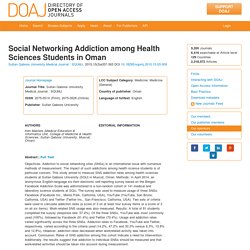
The impact of such addictions among health science students is of particular concern. This study aimed to measure SNS addiction rates among health sciences students at Sultan Qaboos University (SQU) in Muscat, Oman. Methods: In April 2014, an anonymous English-language six-item electronic self-reporting survey based on the Bergen Facebook Addiction Scale was administered to a non-random cohort of 141 medical and laboratory science students at SQU. The survey was used to measure usage of three SNSs: Facebook (Facebook Inc., Menlo Park, California, USA), YouTube (YouTube, San Bruno, California, USA) and Twitter (Twitter Inc., San Francisco, California, USA). 01Cabral. Development of a Facebook addiction scale1. JMIR-Browse by Year. Background: eHealth tools on the Internet have the potential to help people manage their health and health care.
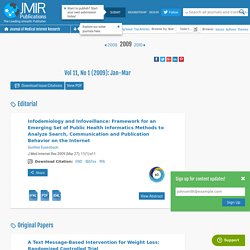
However, little is known about the distribution and use of different kinds of eHealth tools across the population or within population subgroups. Objective: The purpose of this study was to examine the prevalence and predictors of participation in specific online health-related activities. Methods: A secondary data analysis of the National Cancer Institute’s Health Information National Trends Survey (HINTS) 2005 was conducted to study three online behaviors among Internet users (n = 3244): searching for health information for oneself, participating in a support group for those with similar health or medical conditions, and purchasing medicine or vitamins.
Results: A total of 58% of Internet users reported searching for health information for themselves, 3.8% used online support groups, and 12.8% bought medicine or vitamins online in the past year. Teens Addicted to Social Media. I attended an interview with Nancy Jo Sales about her book American Girls: Social Media and the Secret Lives of Teenagers, at the 2016 Woodstock Writers’ Festival.
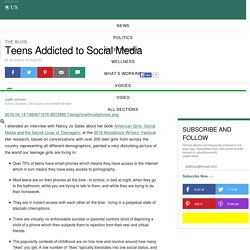
Her research, based on conversations with over 200 teen girls from across the country representing all different demographics, painted a very disturbing picture of the world our teenage girls are living in: Over 70% of teens have smart phones which means they have access to the internet which in turn means they have easy access to pornography. Most teens are on their phones all the time - in school, in bed at night, when they go to the bathroom, while you are trying to talk to them, and while they are trying to do their homework.
They are in instant access with each other all the time - living in a perpetual state of staccato interruptions. There are virtually no enforceable societal or parental controls short of depriving a child of a phone which then subjects them to rejection from their real and virtual friends. 21 Confessions From People Who Are Addicted To Social Media. Awake, alone and addicted ... to social media. The smell hit Drew Horowitz before he even opened the door.
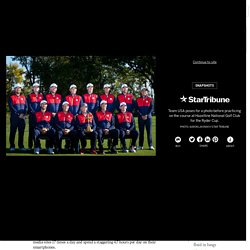
Inside this Maryland bedroom, a 19-year-old woman had isolated herself for months, barely eating, refusing to leave the room to shower, brush her teeth or even urinate. The scene had all the marks of a serious addiction intervention for Horowitz, a drug and alcohol assessment counselor. But this time was different: The drugs that had kept her awake and alone were her computer and social media. “So much of this mimicked a traditional addiction,” said Horowitz, who practices in St. Paul and conducts interventions nationwide. Clearly, this is not the norm. Can that dependence lead to addiction? “I think it’s big and it’s going to get more serious,” he said. The most recent revision of the Diagnostic and Statistical Manual of Mental Disorders (DSM-5), updated in 2013, didn’t recognize cyber addiction as a diagnosable disease but labeled “internet gaming disorder” as a condition for further study.
Your brain on the internet Shannon J. How real a risk is social media addiction? A blog post by social media marketer Jason Thibeault, "Why I just quit Facebook," is sparking new debate about the risks of social media addiction.
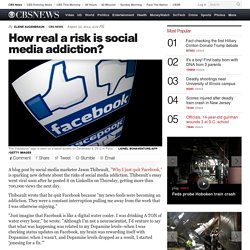
Thibeault's essay went viral soon after he posted it on LinkedIn on Thursday, getting more than 700,000 views the next day. Thibeault wrote that he quit Facebook because "my news feeds were becoming an addiction. They were a constant interruption pulling me away from the work that I was otherwise enjoying. " "Just imagine that Facebook is like a digital water cooler. I was drinking A TON of water every hour," he wrote. "So I quit," he wrote. Thibeault is certainly not alone in his experience of getting a rush online. According to a 2012 study posted on the National Institutes of Health website, "Internet Addiction Disorder (IAD) ruins lives by causing neurological complications, psychological disturbances, and social problems. " Why did Thibault find Facebook, in particular, so addictive?